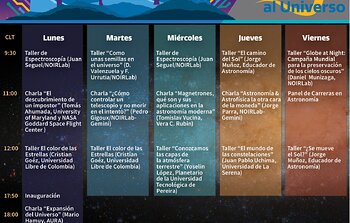Join Viaje al Universo this week!
November 8, 2021

Monday 8 November to Friday 12 November 2021 sees the tenth version of Viaje al Universo, one of the education programs that NSF’s NOIRLab organizes in Chile to bring the wonders of the Universe to students, teachers and families.
Although all the activities this year will again be carried out in virtual form, owing to the pandemic, this year's version will be partly hybrid: students will receive different education kits that will allow them to participate from their homes or schools in activities that are taught during Viaje al Universo week.
Thanks to the kits, students will have the necessary materials to closely follow workshops in which they can learn about the colors of stars, the planets of the Solar System and their different masses, spectroscopy, the layers of the Earth’s atmosphere, the Sun, and the constellations, as well as about how to care for and preserve dark skies. Each workshop will be led by a NOIRLab astronomy education specialist, and will include other professionals from partner institutions such as the Planetarium of the Universidad Tecnológica de Pereira, Colombia, and the Universidad Libre de Colombia.
The program also includes participation from exhibitors who will offer public talks on topics ranging from the exploration of extrasolar planets, the operation of mega telescopes, the expansion of the Universe, the optical technologies that are applied in telescopes, and the people who work behind the scenes to make cutting-edge research possible from Chile.
In addition, the public will be able to participate in a panel of astronomy careers to find out about the professions and trades that are necessary for the functioning and operation of the professional and scientific observatories in Chile. This traditional panel is a unique opportunity to meet first-hand the people who make these huge telescopes possible and learn how to be part of the work team of an astronomical observatory.
The talk The Expanding Universe by the recipient of the distinguished National Prize for Exact Sciences and Director of AURA in Chile, Mario Hamuy, will take place on Monday 8 November 2021: it is free of charge and will be available to watch online.
All Viaje al Universo activities are free and can be followed through NOIRLab’s YouTube channel. The event program is available on our website as well as in our Event Archive. We look forward to seeing you at Viaje al Universo.
More information
NSF’s NOIRLab (National Optical-Infrared Astronomy Research Laboratory), the US center for ground-based optical-infrared astronomy, operates the international Gemini Observatory (a facility of NSF, NRC–Canada, ANID–Chile, MCTIC–Brazil, MINCyT–Argentina, and KASI–Republic of Korea), Kitt Peak National Observatory (KPNO), Cerro Tololo Inter-American Observatory (CTIO), the Community Science and Data Center (CSDC), and Vera C. Rubin Observatory (operated in cooperation with the Department of Energy’s SLAC National Accelerator Laboratory). It is managed by the Association of Universities for Research in Astronomy (AURA) under a cooperative agreement with NSF and is headquartered in Tucson, Arizona. The astronomical community is honored to have the opportunity to conduct astronomical research on Iolkam Du’ag (Kitt Peak) in Arizona, on Maunakea in Hawai‘i, and on Cerro Tololo and Cerro Pachón in Chile. We recognize and acknowledge the very significant cultural role and reverence that these sites have to the Tohono O'odham Nation, to the Native Hawaiian community, and to the local communities in Chile, respectively.
Links
Contacts
Manuel Paredes
Outreach Manager Chile
NSF NOIRLab
Tel: +56 51 2205671
Email: manuel.paredes@noirlab.edu

